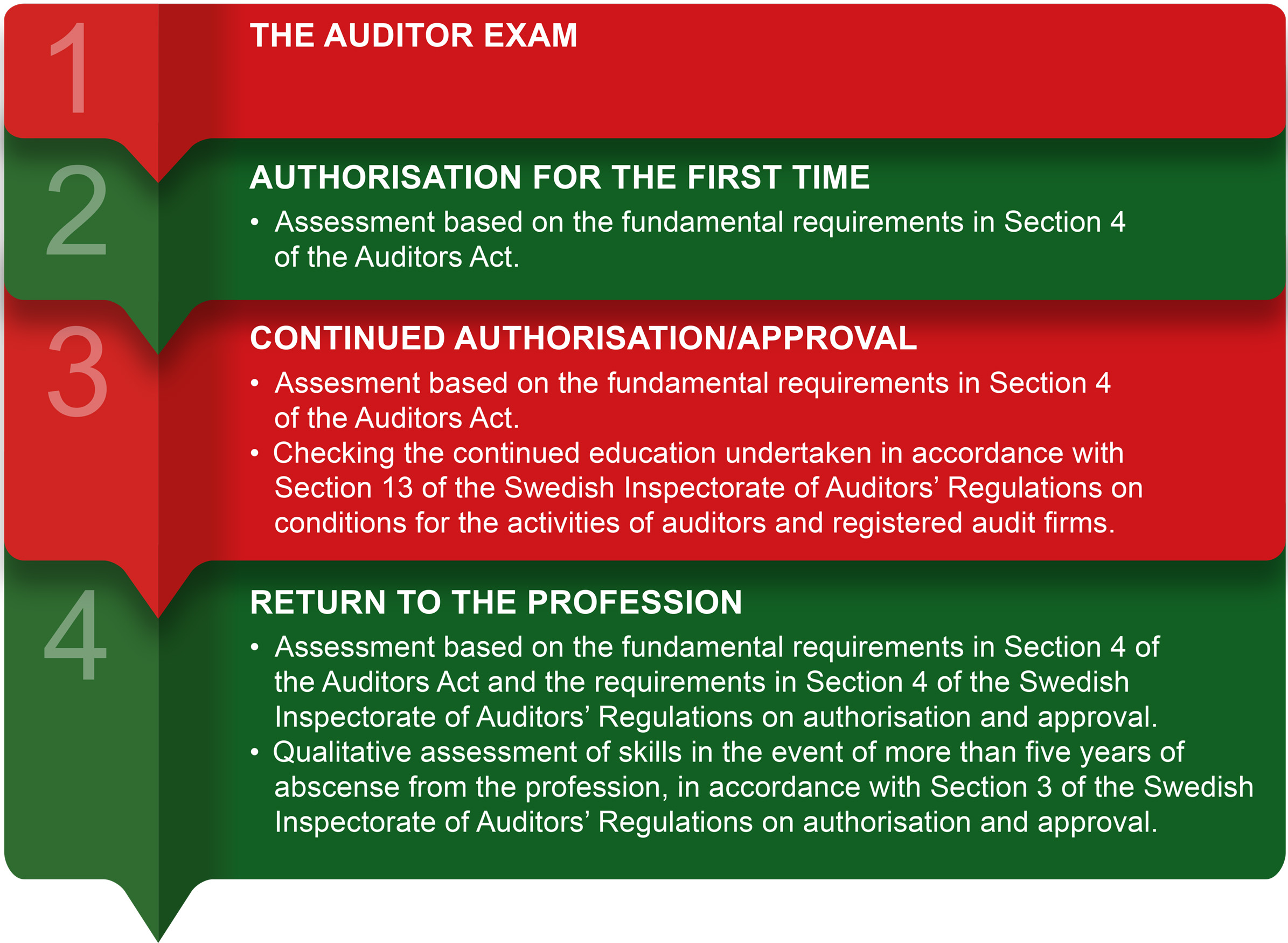Authorisation
In order to be an authorised auditor, it is necessary that you meet certain fundamental requirements and undergo mandatory continued education.
The fundamental requirements
To be an authorised auditor you must
• have passed an auditor exam (or aptitude test) at the SIA,
• be performing audit activities in a professional capacity,
• be resident in Sweden or in another state within the EEA,
• be neither bankrupt, subject to a business ban, have an administrator in accordance with Chapter 11, Section 7 of the Children and Parents Code, be prohibited from providing legal or financial aid in certain cases nor be subject to an equivalent restriction of right of disposition in another state,
• have the education and experience that is needed for auditing activities,
• be honest and otherwise suitable for carrying out auditing activities,
• not be employed anywhere else other than with an audit company or a so-called holding company, and
• have insurance in accordance with the requirements in Section 5 of the regulation (1995:665) on auditors,
It is possible to apply for exemptions to the occupational activity requirement, residence requirement, employment ban and insurance requirement.
If you have been previously authorised or approved as an auditor and want to return to the profession, there is special information available concerning this (see more below).
The full requirements can be found in the Auditors Act (2001: 883) and the SIA’s Regulations (RIFS 2019: 1) on authorisation and approval and sections 15 and 16 of it’s Regulations (RIFS 2018: 2) on conditions for the activities of auditors and registered audit firms.
Continued education
Under Section 6 of the regulation (1995:665) on auditors, authorised and approved auditors must undergo continued education. The purpose of the continued education is to retain the knowledge and abilities that are included in the basic education for auditors (The Auditor Exam).
The continued education will ensure that the auditor has sufficient theoretical knowledge to carry out statutory audits in companies of different sizes and with different kinds of activities, as well as the capacity to apply such knowledge in practice in audit work.
More detailed provisions on continued education are available in Section 13 of the SIA’s Regulations (RIFS 2018:2) on conditions for the activities of auditors and registered audit firms.
Continued education takes place in the manner and to the extent that follows under good auditing practises. This includes that it will be systematic and with a professional orientation. Guidelines on the manner and scope of the continued education can be found in recommendation number four on ethical issues (EtikR 4) Ongoing education published by FAR (Swedish Institute for Authorised and Public Accountants).
Every five years the SIA will require verification that the continued education has amounted to at least 100 verifiable hours within 20 specified subject areas.
Normally, a third party should be able to both certify and confirm that the auditor has undergone certain continued education in order for it to be considered verifiable.
Return to the profession
If more than five years have passed since you were authorised/approved, you must submit a special report on your education and experience, along with your application for authorisation. The report must describe how you have retained or developed theoretical knowledge and practical skills needed for audit activities after the expiry of the authorisation or approval.
In the report, you must outline the relevant activities that you have spent time on since the expiry of the authorisation/approval, e.g. employment or studies. An activity is relevant and must be reported if it has contributed to the maintenance or development of theoretical knowledge and practical skills needed for audit activities. Therefore, the report should include knowledge and abilities, in particular those within the 20 subject areas that are included in the basic education of auditors.
The SIA will do an overall individual assessment of the level of the education and experience in each separate case.
Graphical overview of the authorisation system
Written description of graphical diagram of the authorisation system

